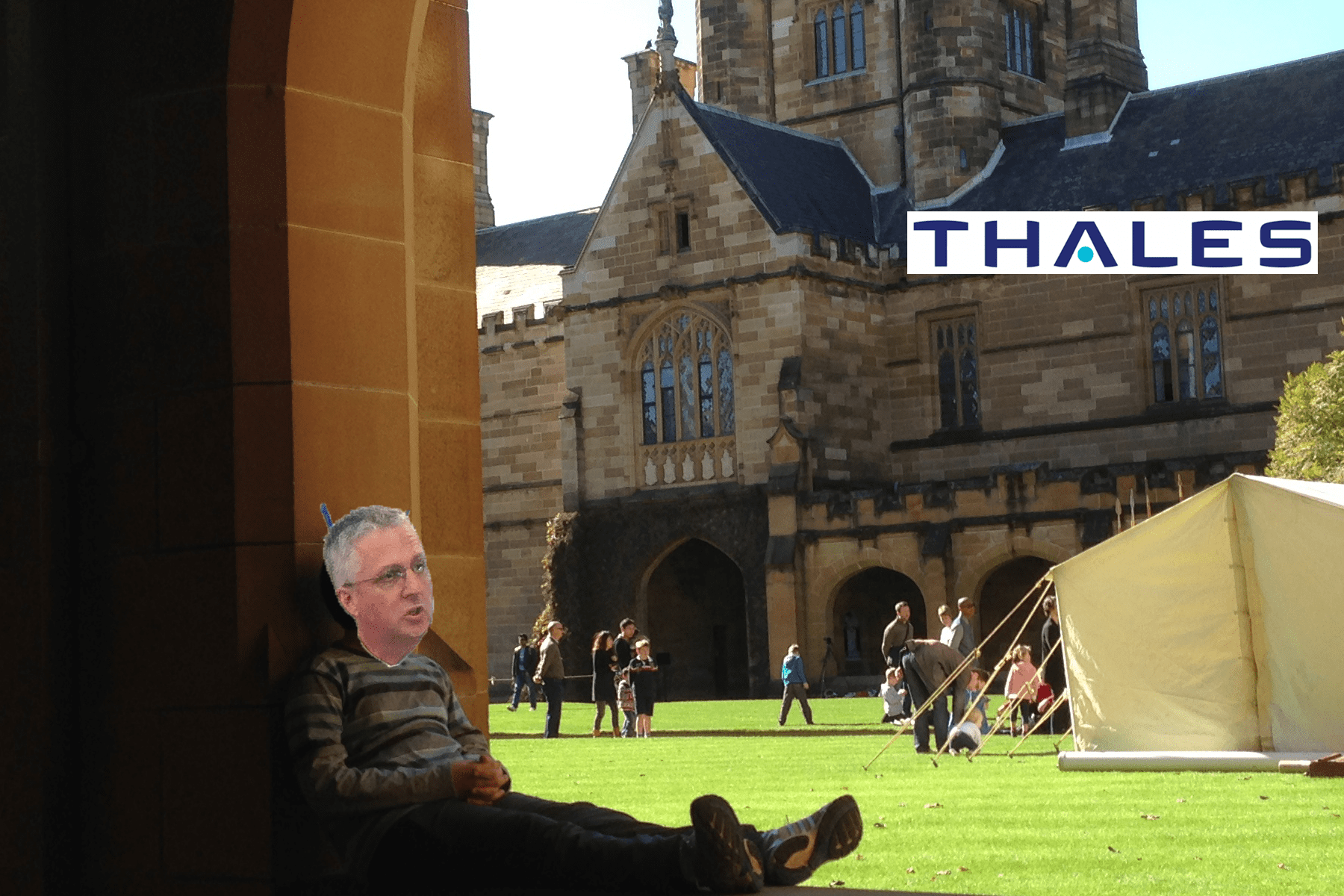The University of Sydney renewed its partnership with Thales Australia, one of the world’s largest arms manufacturers, in December 2022. Thales first signed a memorandum of understanding (MOU) with USyd in 2017, sponsoring eight engineering industry placements and providing funding for PhD research. The recently extended deal will further allow Thales to conduct research into high-tech weaponry and military systems on campus. Agreements like this have no place on campus because they only exist to exploit graduates and researchers into growing and sustaining the military and weapons industry. Universities should be for education, not for expanding Australia’s capacity for destruction.
The University’s ties with Thales date back several years, including in the period in which USyd’s Chancellor Belinda Hutchinson was appointed as the chairperson of Thales Australia’s board. It’s not Hutchinson’s only evil act — she and her husband purchased their $20 million Point Piper house in 2018 with funds obtained from involvement in arms manufacturing, climate destruction, gambling, and other unsavoury industries. The University claims that her ties to Thales have nothing to do with their ongoing partnership. Regardless of whether or not this is true, the fact that Hutchinson is now in her third term as Chancellor demonstrates that management has no qualms about the public face of the University being openly linked to militarism.
Thales is complicit in a long list of brutal conflicts around the world and continues to provide arms to major global powers. Their weapons, surveillance systems, and vehicles have been used to wage destruction in places like Iraq, Afghanistan, Palestine, Yemen, Syria, East Timor, and West Papua. And as one of the largest defence contractors in Australia, every person who has stared down the barrel of an Australian Army gun has seen first-hand the products of Thales. In 2021 alone, the Australian government spent around 800 million Euros — over 1.2 billion Australian dollars — on Thales products.
Thales facilitate every stage of warfare, from the tangible weapons used to the technology involved in planning heinous attacks against innocent people. They produce the Australian Army’s standard gun – the F88 Austeyer – as well as a range of munitions and powders. They also produce transports to send troops into other countries to commit atrocities, like those detailed in the Brereton report into Australian war crimes in Afghanistan, described by the Director-General of the ADF as “possibly the most disgraceful episode in Australia’s military history.” Reports produced by the World Peace Foundation and the Stockholm International Peace Research Institute also reveal that fraud, political lobbying, bribery and sales to repressive regimes are inalienable to the weapons trade. These are the exact opposite of the values that an educational institution should impart.
Not satisfied with just creating enormous levels of destruction through their role in weapons production, Thales also helps secure borders. The defence giant produces surveillance drones and operates the Eurodac system, a biometric security database that holds information about every asylum seeker in the European Union. This technology not only denies safety to refugees fleeing from war, climate change, and other disasters, but also dehumanises them by encroaching on their privacy.
Thales wants to increasingly integrate itself into university faculties and research teams, promising an expansion of their insidious presence on campus. University management, not satisfied with last year’s $1 billion surplus, is constantly looking for ways to turn a profit and help gear the University towards what Australian industry, and the military in particular, demand — particularly given rising imperialist tensions. USyd management is clear that increasing the amount of defence research that takes place on campus is a key objective.
“As the collaboration develops,” they note, “both parties intend to embed staff within each other’s organisation to accelerate the translation of research and development into solutions that bring impact to the community, particularly focusing on national security outcomes.”
There are an increasing number of projects on campus explicitly geared towards furthering the ability of the Australian armed forces to wage war. Further, even seemingly harmless coursework, well outside of transparently militaristic projects, may involve training AI or developing some part of a military system for ulterior defence motives.
Our university should play no part in increasing the number of lives lost in murderous wars and armed interventions across the world. Military-funded research and coursework will also be expected to demonstrate military value. When alternative sources of university funding (read: government funding) are crowded out by arms dealers, students and academics are pressured to play a part in Australia’s increasing push for militarisation. This will fundamentally stifle the ability of students and staff to engage in education as a social good, which should be the institution’s primary aim.
As students, we shouldn’t take part in weapons development, or maintain silence while university management gears research towards this destruction. Management cares most about their bottom line and propping up the Australian war machine. On the other hand, we have an interest in free, quality education which is primarily about improving the society we live in.
If we want management to cut ties with Thales, we are going to have to fight for it. The University should tear up its renewed agreement with Thales, get rid of all joint projects, sack Belinda Hutchinson, and redirect money from military partnerships into free, quality education that exists for the good of humanity.
This is why in order to win, we need all the help we can get. Management cheerfully tells us that weapons development helps “make Australia and the world a better place to live”. They are not going to change their minds unless we force them to.
This opinion piece has been amended to more adequately reflect the University’s associations with Thales.





